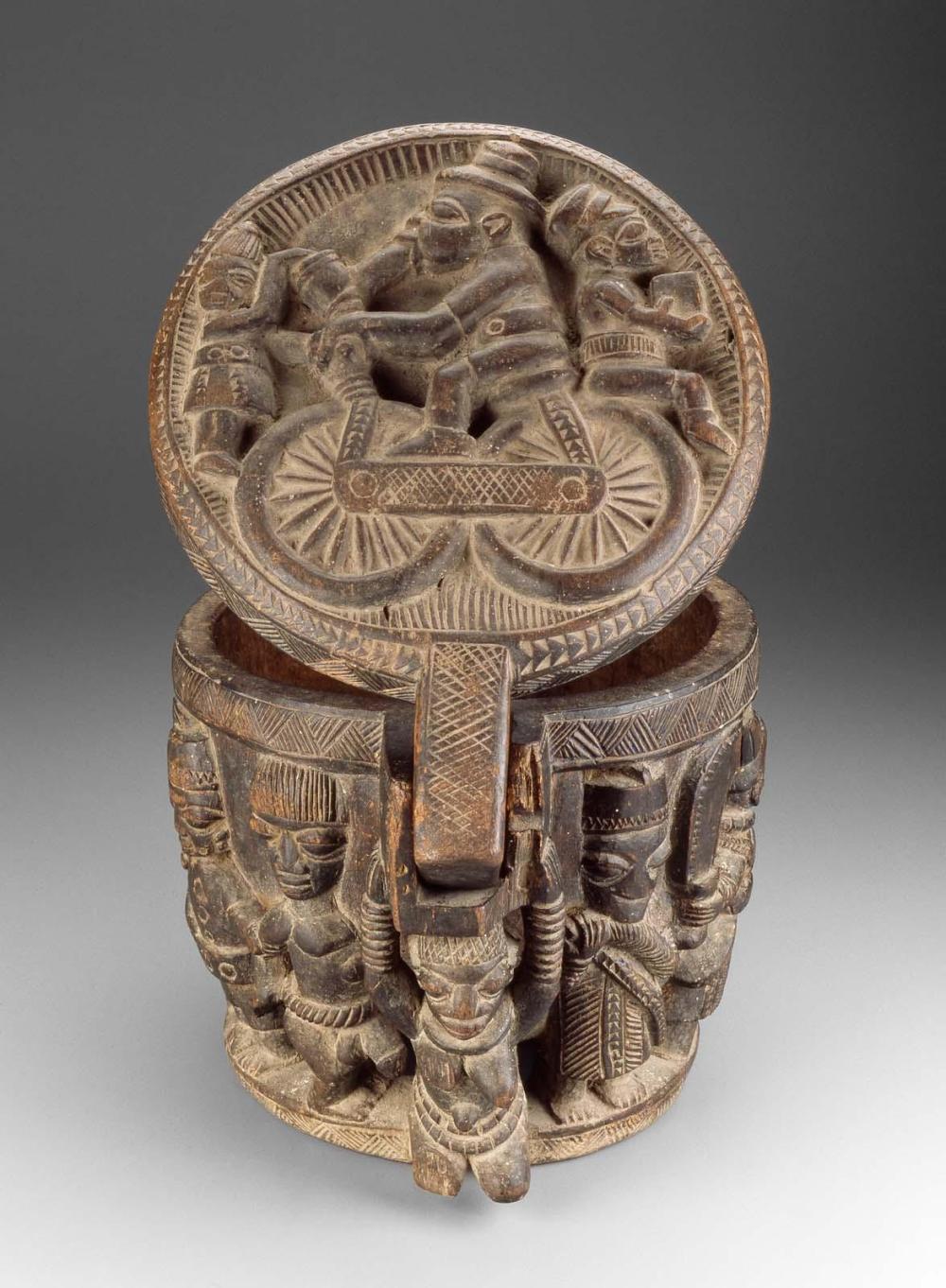Advanced Search
With its broad mouth and hinged lid, this bowl once held the equipment of a successful diviner who could afford the services of Arowogun, a famed Yoruba artist living in the Nigerian town of Osi-Ilorin. Arowogun is known for iconography that captures the tumultuous changes in Yoruba life in the early twentieth century. On the lid of the bowl, a figure rides a bicycle while smoking a pipe. A colonial officer is seated on the rear, and a woman perched on the front fender keeps his pipe filled. The rider is likely Esu, one of the gods of the Yoruba pantheon, who carries messages between this world and that of the gods. He wears shorts and a hat, connecting him to the new fashions of the colonial occupiers. His central placement and size in comparison to the small government official on the back of the bike suggest Esu’s power and confidence even in the midst of political change.
On the base of the bowl, the images are violent. Men enslave captured enemies, imprisoning them with rope and threatening them with swords. After the fall of the Yoruba kingdom of Oyo in the 1830s, other kingdoms fought for control of regional trade, and constant warfare and slave-raiding ensued. The one quiet figure on the lower half of the bowl is a woman kneeling and supporting the hinge, a devoted supplicant sure to find her way through the chaotic world with the advice of Esu.
In Nigeria and Benin, Yoruba men and women may consult a diviner when making an important decision about the future: starting a new business, getting married, or deciding how to raise a child. After years of training and apprenticeship, diviners guide clients using verses of the Odu Ifa, a 256-verse compendium of Yoruba wisdom, selected with the sacred implements that would have been stored in this bowl.
Diviner's Bowl (opon igede ifa)
Arowogun (Areogun) of Osi-Ilorin (Nigerian (Yoruba peoples), about 1880–1956)
Yoruba
c. 1900-1950
Object Place: Osi-Ilorin, Nigeria
Medium/Technique
Wood, pigment traces
Dimensions
Height: 31.11 cm (12 1/4 in.) Diameter: 29.21 cm (11 1/2 in.)
Credit Line
Gift of William E. and Bertha L. Teel
Accession Number1991.1066
CollectionsAfrica and Oceania
ClassificationsReligious and cult objects
With its broad mouth and hinged lid, this bowl once held the equipment of a successful diviner who could afford the services of Arowogun, a famed Yoruba artist living in the Nigerian town of Osi-Ilorin. Arowogun is known for iconography that captures the tumultuous changes in Yoruba life in the early twentieth century. On the lid of the bowl, a figure rides a bicycle while smoking a pipe. A colonial officer is seated on the rear, and a woman perched on the front fender keeps his pipe filled. The rider is likely Esu, one of the gods of the Yoruba pantheon, who carries messages between this world and that of the gods. He wears shorts and a hat, connecting him to the new fashions of the colonial occupiers. His central placement and size in comparison to the small government official on the back of the bike suggest Esu’s power and confidence even in the midst of political change.
On the base of the bowl, the images are violent. Men enslave captured enemies, imprisoning them with rope and threatening them with swords. After the fall of the Yoruba kingdom of Oyo in the 1830s, other kingdoms fought for control of regional trade, and constant warfare and slave-raiding ensued. The one quiet figure on the lower half of the bowl is a woman kneeling and supporting the hinge, a devoted supplicant sure to find her way through the chaotic world with the advice of Esu.
In Nigeria and Benin, Yoruba men and women may consult a diviner when making an important decision about the future: starting a new business, getting married, or deciding how to raise a child. After years of training and apprenticeship, diviners guide clients using verses of the Odu Ifa, a 256-verse compendium of Yoruba wisdom, selected with the sacred implements that would have been stored in this bowl.
ProvenanceAugust, 1986, acquired in Nigeria [see note 1] and bought by Charles Davis, Davis Gallery, New Orleans; autumn 1986, sold by Davis Gallery to William and Bertha Teel, Marblehead, MA; 1991, year-end gift of William and Bertha Teel to the MFA. (Accession Date: January 22, 1992)
NOTES:
[1] According to Charles Davis this comes from the village of Omu-Aran, Nigeria. It is not known from whom the gallery acquired it.
NOTES:
[1] According to Charles Davis this comes from the village of Omu-Aran, Nigeria. It is not known from whom the gallery acquired it.





